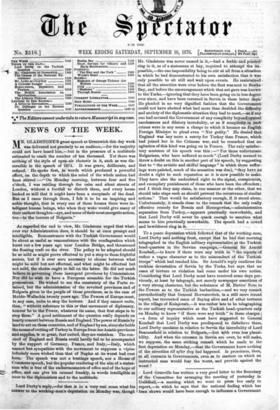As regarded the end in view, Mr. Gladstone urged that
what- ever our Administration does, it should be at once prompt and intelligible. Remonstrance with the Turkish Government would be about as useful as remonstrance with the conflagration which burst out a few years ago near London Bridge, and threatened the floating craft on the river. The policy to be adopted should be as mild as might prove effectual to put a stop to these frightful scenes, but if it ever were necessary to choose between what might be mild but not effectual, and what might be effectual but not mild, the choice ought to fall on the latter. He did not much believe in governing these insurgent provinces by Commissions. Nor did he wish to have a European scramble for the Turkish possessions. He wished to see the suzerainty of the Porte re- tained, but the administration of the revolted provinces and of Bulgaria given to the people of those provinces, as in the case of Moldo-Wallachia twenty years ago. The Powers of Europe must, in any case, unite to stop the horrors. And if they cannot unite, then, "without reference to this or that movement of diplomacy, honour be to the Power, whatever its name, that first steps in to stop them." A good settlement of the question really depends on hearty concert between Russia and England. The power of Russia by landto act on these countries, and of England by sea, since she holds the means of cutting off Turkey in Europe from her Asiatic provinces and supplies, is so great, that united, they are realities's. The con- cord of England and Russia could hardly fail to be accompanied by the support of Germany, France, and Italy,—Italy, which cannot but sympathise with the movement to suppress a regime infinitely more wicked than that of Naples at its worst had ever been. The speech was not a hustings speech, nor a House of Commons speech, but the popular rendering of the aim of a states- man who is free of the embarrassments of office and of the hope of office, and can give his counsel frankly, in words intelligible at once to the diplomatists and to the multitude.






























